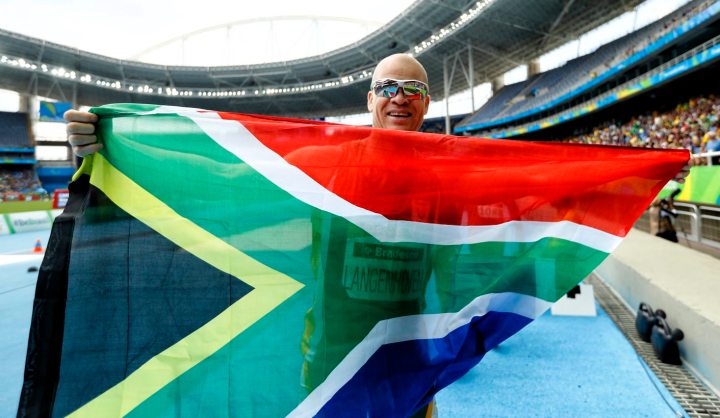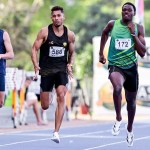Sport
The Sound of Victory: How the medals at the Rio Paralympics are ringing in tune with the times

The medals at the Rio Paralympics all make a sound when shaken, with different tones for gold, silver and bronze. While this gesture might seem like something small, it’s a-ha moments like these that form a critical part in ensuring the Games force us all to make little changes for our society to be more inclusive. By ANTOINETTE MULLER.
If you’ve been watching the Olympics and the Paralympics you might be familiar with athletes biting down on their medals. If you’ve watched any of the victory ceremonies for visually impaired athletes at the Paralympics, you might also have seen what appears to be athletes listening to their medals. In this case, appearances aren’t deceiving.
While the Paralympic medals have had braille inscriptions for years, the Rio medals are slightly different. They also make a sound.
These medals have been designed with tiny metallic spheres rattling inside them when shaken and each of the gold, silver or bronze medals makes a different sound.
The bronze medals have 16 steel balls which make a soft sound, the silver medals have 20 balls and the gold medals 28, which produce the loudest rattle.
Designer Claudia Gamboa said she had a “eureka moment” while discussing improvements to the medals. Olympics design manager Dalcacio Reis said in an interview with Public Radio International that they wanted to change the way athletes celebrate on the podium.
“To not just be able to show the medal, but for those who have a visual or sensory impairment to be able to feel it not just by touching it, not just with the Braille that is on it, but with its sound,” Victor Hugo Berbert, the person in charge of the sound element, told International Business Times.
The special feature of the new medals were announced in June, but on Tuesday the official Olympics Instagram account shared an image of the medals and athletes listening to their medals and explaining how the medals work.
While this might seem like a minor detail to many, for the designers, stakeholders and athletes, it is another small step towards inclusivity. It should also force introspection for those blessed with all our senses and limbs. Since the Paralympics was first held in the 1960s, introspection and inclusivity have been a big part of the Games’ legacy.
While Rio has come under scrutiny for sparse ticket sales, budget cuts and administration issues, other cities that have hosted the Games have made changes that allow transition into a more inclusive society. Beijing, for example, invested heavily in infrastructure to ensure that thousands of facilities are more accessible for people living with disabilities in the country.
It also allowed the public to better understand disabilities, in a country where people who are disabled are often treated like outcasts. Ramps for wheelchairs, street cross signals for the blind and “kneeling” buses were all part of the infrastructure rolled out in the lead-up to the Games.
“Ordinary Chinese people were able to understand disability better than before,” Zheng Xiaojie, secretary of the Hong Dan Dan centre, an organisation supporting the blind in Beijing, said in an interview with The Independent in 2008.
“Many disabled people became more confident, asking about their rights. Before they had been very quiet,” she added.
The 2012 London Paralympics racked up a record number of spectators – 2.8-million in total – with 3.8-billion watching on TV. Yet, despite the positive impact in a number of countries and the support the athletes receive, the battle is far from over. Activist groups remain sceptical over the greater impact of the Games and whether they can really help bring change.
On the anniversary of the Paralympics in 2013, an opinion poll by the disability charity Scope revealed that most disabled people thought that attitudes towards them had failed to improve.
Athletes are also divided over bolting “para” onto events. Javelin thrower, Madeline Hogan, said in an interview with SBS that the prefix seems unnecessary.
“It doesn’t concern me too much. To be honest I don’t really see there’s a need for it. We don’t call it ‘able-bodied rowing’. Whether I’m missing an arm or not I’m still throwing a javelin.”
Other athletes feel that the prefix underpins the existence of the sport. What all athletes do agree on is that the Paralympics play a critical role in challenging perceptions – and that brings us back to the ringing medals.
There are a lot of things able-bodied people are ignorant about when it comes to disabilities. There are things we don’t consider. Think, for example, of watching TV – somebody who is deaf cannot watch or enjoy things in the same way as you do if there are no subtitles.
There are countless examples like this and, just as designer Gamboa had her a-ha moment when the medals were being improved, so too, should the Paralympics – and lovely gestures such as the ringing medals – lead us to more a-ha moments to make our society more inclusive. DM
Photo: Hilton Langenhoven of South Africa celebrates after winning the gold medal in the event. 2016 Rio Paralympics – Men’s Long Jump – T12 Final – Olympic Stadium – Rio de Janeiro, Brazil – 10/09/2016. REUTERS/Jason Cairnduff




















 Become an Insider
Become an Insider